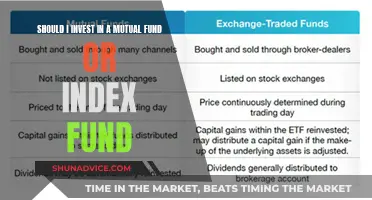
Investing in mutual funds is a popular choice for many people, especially those who don't want to pick individual investments but still want to benefit from the stock market's high average annual returns. Mutual funds are a good option for anyone looking to diversify their portfolio and reduce the risk of overconcentration. They are also a convenient and low-cost way to invest in a wide range of securities without needing extensive market knowledge. However, it's important to note that mutual funds come with some risks and fees, and investors should carefully consider their individual circumstances before investing.
| Characteristics | Values |
|---|---|
| Instant Diversification | Mutual funds invest in a wide range of assets, including stocks, bonds, and other securities, reducing the risk of individual stock performance impacting the overall portfolio. |
| Accessibility | Mutual funds are open to individual investors with varying budgets, allowing anyone to participate in the market and benefit from its returns. |
| Liquidity | Investors can easily buy or sell mutual fund shares, providing flexibility and convenience. |
| Professional Management | Fund managers make investment decisions and handle transactions, saving investors time and effort. |
| Affordability | Mutual funds offer diversification and convenience at a low cost, with some funds having minimum investments as low as $100. |
| Tax Implications | Profits from mutual funds are subject to tax as capital gains, with different classifications based on fund type and duration. |
| Risk | Mutual funds carry inherent risk as the value of investments can fluctuate based on market conditions. |
| Fees and Expenses | Mutual funds have associated fees and expenses, such as expense ratios, sales loads, and transaction fees, which can impact overall returns. |
What You'll Learn

Mutual funds vs. individual stocks
When deciding whether to invest in mutual funds or individual stocks, it's important to understand the differences between the two and the advantages and disadvantages of each.
Mutual Funds
Mutual funds are a type of investment vehicle that pools money from multiple investors to purchase a diversified portfolio of assets. They are managed by professionals and can include a wide range of stocks, bonds, and other securities. Mutual funds offer instant diversification, which reduces risk, but may also limit potential gains. They are often a good choice for investors who want to participate in the stock market but don't want to pick and follow specific stocks.
Advantages of Mutual Funds
- Diversification: Investing in multiple companies as part of a diversified fund spreads out risk, which can be more challenging to achieve when picking individual stocks.
- Risk Mitigation: If an individual stock loses value, other stocks in the mutual fund can help balance it out, reducing the impact on your overall investment.
- Professional Management: Financial professionals choose and manage the stocks in the fund, so you don't need to closely monitor individual stocks.
- Specific Industry Exposure: Mutual funds allow you to invest in specific industry sectors without having to individually choose stocks.
- Lower Costs: The cost of trading is spread over all investors in the fund, resulting in lower costs per individual.
- Convenience: Mutual funds save you the time and effort of researching and selecting individual stocks.
Disadvantages of Mutual Funds
- Limited Control: Investors give up some control as they rely on the fund's managers to choose the stocks.
- Fees: Mutual funds often have management fees, and some funds charge a fee for buying or selling shares early.
- Potential Underperformance: Actively managed funds may underperform the market, and you could lose money.
- Tax Implications: Distributions from mutual funds may create taxable gains, even if you haven't sold your shares.
Individual Stocks
Investing in individual stocks means buying shares of a single company. This gives you more control over your investments and the potential for higher returns, but it also comes with higher risk and volatility.
Advantages of Individual Stocks
- Control: You decide which stocks to invest in.
- Higher Potential Returns: If a stock performs well, you'll get all the benefits of that increase.
- Exciting and Rewarding: Some people find it exciting and rewarding to pick and follow specific stocks.
- Easy to Trade: Individual stocks are typically easy to trade through online brokers or apps.
- Low Trading Costs: Many brokerages don't charge trading fees for individual stocks.
Disadvantages of Individual Stocks
- Higher Risk: Individual stocks are more volatile, and there is a potential for large losses if the stock price drops.
- Time Commitment: Researching and monitoring individual stocks can be time-consuming.
- Stress: Investing in stocks can be an emotional rollercoaster, and it's important to understand your risk tolerance.
- Brokerage Fees: You may be charged a brokerage fee every time you buy or sell a stock.
The choice between mutual funds and individual stocks depends on your investment goals, time horizon, and risk tolerance. Mutual funds offer diversification and convenience, making them a good choice for long-term retirement portfolios. Individual stocks provide the opportunity for higher returns but come with more volatility. For beginners, starting with mutual funds can be a good way to build a portfolio before branching out into individual stocks. Ultimately, you can use both mutual funds and individual stocks in your portfolio to help you grow your wealth and meet your financial goals.
Stable Value Funds: Bond Investments and Returns
You may want to see also

Active vs. passive funds
Mutual funds can be actively or passively managed. The main difference between the two is that active investing involves a fund manager who picks and chooses investments, while passive investing typically tracks an existing group of investments called an index. Passive investing strategies often perform better than active strategies and are more cost-effective.
Active investors research and closely follow companies, buying and selling stocks based on their view of future performance. This approach is more suitable for professionals or those who can devote a lot of time to research and trading. Active fund managers buy and sell daily, aiming to find stocks that can beat market averages.
On the other hand, passive investors buy a diverse basket of stocks and continue to buy or sell regularly, regardless of market fluctuations. This approach requires a long-term mindset that disregards the market's daily changes. Passive fund managers aim to match the market average and are content to be the market average.
Advantages of Passive Investing:
- Ultra-low fees: Passive funds have lower fees as there is no need to pay for stock analysis.
- Transparency: Investors know which assets are in an index fund.
- Tax efficiency: The buy-and-hold strategy does not typically result in a large capital gains tax for the year.
Disadvantages of Passive Investing:
- Limited: Passive funds are limited to a specific index or predetermined set of investments, offering less flexibility.
- Small returns: Passive funds rarely beat the market and are unlikely to post significant returns.
- Reliance on others: Passive investors rely on fund managers to make decisions and have less control over their investments.
Advantages of Active Investing:
- Flexibility: Active managers can buy stocks they believe will perform well and are not limited to a specific index.
- Hedging: They can use strategies like short sales or put options to insure against losses.
- Tax management: They can employ strategies tailored to individual investors, such as selling money-losing investments to offset taxes on winners.
Disadvantages of Active Investing:
- Expensive: Active funds have higher fees due to transaction costs and analyst team salaries.
- Active risk: Freedom to buy any investment may lead to costly mistakes.
- Management risk: Fund managers are human and can make poor investment decisions.
While passive investing tends to be more popular due to its lower fees and better performance, some investors prefer active investing for the expertise of a fund manager, especially during volatile market conditions.
A Guide to Investing in Australia's Managed Funds
You may want to see also

Tax implications of mutual funds
Mutual funds are a popular investment choice due to their accessibility, liquidity, and potential for diversification. However, it's essential to understand the tax implications associated with them.
When a mutual fund company distributes earnings and other payouts to shareholders, it is known as a distribution. These distributions are usually made at the end of each year when net amounts, including capital gains and other earnings, are calculated after deducting expenses.
As a shareholder, you are responsible for reporting mutual fund transactions on your tax return and paying the appropriate taxes on each type of fund income. This includes both distributions and capital gains. If you hold shares in a taxable account, you must pay taxes on distributions, whether paid out in cash or reinvested in additional shares. Additionally, you must report and pay taxes on any gains and dividends from buying or selling shares within the fund.
There are different types of distributions, each taxed differently:
- Long-term capital gains: Gains from selling shares held for more than a year are usually taxed at lower rates than ordinary income.
- Short-term capital gains: Gains from selling shares held for one year or less may be taxed as ordinary dividends, subject to ordinary income tax rates.
- Ordinary or non-qualified dividends: Investment income earned by the fund from interest and non-qualified dividends, minus expenses, is often taxed at ordinary income tax rates.
- Qualified dividends: Dividends from common stock of domestic and qualifying foreign corporations are typically taxed as long-term capital gains.
- Interest on fixed-income securities: Interest earned is generally taxed at ordinary income tax rates.
- Interest on federal debt instruments: Interest is taxed at ordinary federal income tax rates but is exempt from state income tax.
It's important to note that mutual funds in retirement and college savings accounts are tax-advantaged. You only pay taxes on earnings or pre-tax contributions when you withdraw them.
When deciding whether to invest in mutual funds, consider the tax implications and consult a financial advisor or tax professional for personalized advice based on your specific circumstances.
Funding an Investment Account: Strategies for Success
You may want to see also

How to pick the best mutual funds
Mutual funds are a great way to invest in a diversified portfolio of securities without needing extensive market knowledge. They are managed by professionals and offer investors accessibility, liquidity, and the potential for diversification. However, it's important to remember that mutual funds also come with some risks and fees. When picking the best mutual funds for your portfolio, consider the following:
- Risk tolerance and time horizon: Determine how much risk you are willing to take and how long you plan to invest. If you have a short investment horizon and are risk-averse, consider bond or money market funds. If you have a longer time horizon and can withstand temporary losses, stock funds may be a better option.
- Portfolio balance: Evaluate your current portfolio to identify any gaps or imbalances. For example, you may need to add stock funds if you are heavily invested in bonds or vice versa.
- Fund performance: Look at the fund's longer-term track record over five or ten years rather than just its recent performance. A fund that has consistently outperformed over a longer period is more likely to continue doing so.
- Fees and expenses: Consider the expense ratio, sales load, and other fees associated with the fund. Index funds, for instance, tend to have lower fees than actively managed funds.
- Fund type: Choose between stock funds, bond funds, money market funds, balanced funds, target-date funds, commodity mutual funds, and alternative mutual funds, each offering different levels of risk and potential returns.
- Active vs. passive funds: Active funds aim to outperform the market but come with higher fees, while passive funds aim to match market performance and are often more cost-effective.
- Diversify your investments: Don't put all your eggs in one basket. Spread your investments across multiple mutual funds to reduce risk.
- Research and compare: Do your research and compare different funds before investing. Look at their historical performance, fees, and investment strategies to make an informed decision.
- Consider your financial goals: Ensure the mutual fund aligns with your financial goals and risk tolerance.
- Seek professional advice: If you are unsure, consult a financial advisor or consultant to help you make informed investment decisions.
Mutual Funds vs. IRAs: Which Investment Option is Better?
You may want to see also

Pros and cons of mutual funds
Mutual funds are a popular investment choice for many people. They offer a convenient way to invest in a diversified portfolio of securities without requiring extensive market knowledge or constant monitoring. Here are some pros and cons to consider:
Pros of Mutual Funds:
- Diversification: Mutual funds invest in a broad range of assets, such as stocks, bonds, and other securities, reducing the risk of individual stock or bond performance impacting the overall portfolio.
- Accessibility: Mutual funds are open to individual investors with various budget sizes, allowing anyone to participate in the market and benefit from its returns.
- Liquidity: Investors can easily buy or sell mutual fund shares, providing flexibility and convenience.
- Professional management: Fund managers have expertise in selecting and managing investments, so investors don't need to constantly monitor their portfolio.
- Compounding: Mutual funds offer the power of compounding, allowing investors to generate higher returns over time.
Cons of Mutual Funds:
- Fees and expenses: Mutual funds often come with fees and expenses, including expense ratios and sales charges, which can impact overall returns.
- Tax implications: Investors may receive capital gains distributions from the fund, which can be taxable if held in non-retirement accounts.
- Limited trading: Mutual funds are typically bought and sold at the end of the trading day, calculated based on the net asset value (NAV).
- High initial investment: Compared to other investment options, mutual funds usually require a higher initial investment, often a few thousand dollars.
- Performance variability: Chasing past performance is not always a successful strategy. It's important to assess a fund's long-term track record and consider the fund's fees and your risk tolerance.
Mutual Funds 101: Best Places to Invest for Beginners
You may want to see also







